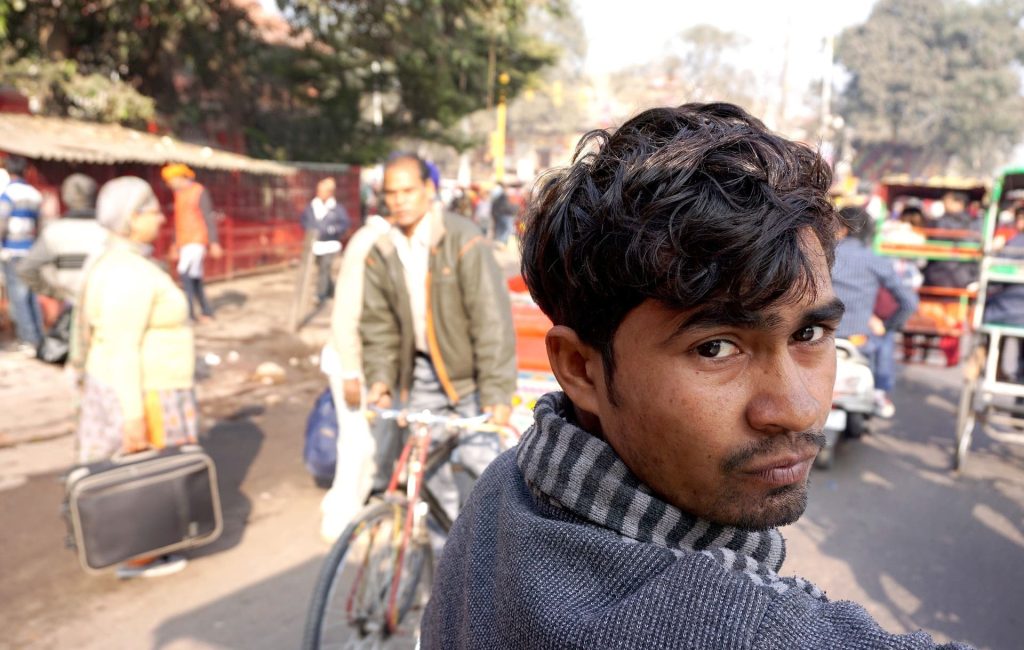They break out of the slums, the country full of contrasts, where luxury hotels and expensive boutiques are growing next to the poor districts. From India, the second largest country in the world with 1.34 billion people (data from 2017), they come to Poland, where they can earn PLN 4,000 clear. In India, the national average is just over PLN 870 (in rural areas, an employee receives only PLN 235 per month!). That is why our homeland appears to the Indians as a land flowing with milk and honey. They travel to a distant country, more than 6,000 kilometers from their home. They have one goal: to find hope for a better life and a decent job.
Poor Indians, but with work experience and qualifications
– In Poland, Indians are looking for a better life. They are hardworking, reliable and learn quickly. I must admit that at the beginning I was not convinced to employ either Ukrainians or Indians. Now, however, I bet on both. It is not about salaries for these workers at all. They earn with us just like Poles. It’s about their attitude to work. By the way, perhaps I am lucky with employees from both of these foreign countries – tells us one of the owners of a large automotive company that has been cooperating with Pajmon CPT for two years. – It is from Pajmon CPT that I have very valuable mechanics from Ukraine and electricians from India with high qualifications – adds Pajmon CPT business partner.
As it turns out, Pajmon CPT has a large group of Indians in its employee base. Among them there are both low-skilled workers and specialists from various industries. The system includes, among others: electricians, welders, and builders, and often professionals with certificates confirming their professional skills and with references from previous employers. Pajmon CPT provides Indians with attractive remuneration and accommodation in Poland.
Hindus acquire academic knowledge
For example, eight electricians from India delegated by Pajmon CPT work in one of the companies from the Warmian-Masurian Voivodeship, which provides services in the field of automation and industrial robotics. These workers spend 10 hours in the factory. They have interesting professional experience. They worked in their country for several years in industries such as oil and construction. They also gained academic knowledge, e.g., at the Thapar Institute of Engineering and Technology. They perform from simpler to more complex tasks assigned to the work of an electrician. They can lay cables and electric wires, set cable routes, repair lighting wires or those connected with the sound system, or conduct wire tests.
Working in a Polish workplace is as demanding and responsible for them as in their home country. In our country, however, they are gaining more experience in advanced projects. Their duties include low-voltage installations, electrical cabinets and switchboards. New employees are able to analyze technical documentation, read drawings and various diagrams, or keep project documentation. Industrial electronics is not a secret for them either. Therefore, electricians from India constitute a strong core of the team of professionals in this Polish workplace.
Hindus build houses for sheikhs and work in large factories
In turn, other employees obtained from India by Pajmon CPT work, among others in the construction industry or in production in companies located in Upper Silesia. Builders in particular have an impressive CV. Before coming to Poland, they built, among others, houses of sheikhs in Dubai. In our country, they have already worked in the mine. Now they are insulating buildings. They are real professionals. They know how to work. They have all the construction knowledge at their fingertips. They will undertake every task, from laying the foundations of buildings, reinforcement, bricklaying, assembly, to screeds, scaffolding work, roof trusses, plastering and all finishing works: smoothing, painting, tiling, laying panels, or building stairs.
Welders from India, employed by a trailer manufacturer, one of Pajmon CPT’s contractors from the Silesian province, also have an interesting professional past. One of the standout people here is an employee who has several years of experience in the field of precise welding of various, also very small, elements. He also specializes in welding decorative elements, e.g., handrails, wickets, fence gates. In the Polish facility, he has found himself in a position that requires him to weld using MIG MAG methods. These methods consist of welding aluminum, copper and other non-ferrous metals and their alloys, joining unalloyed, low-alloy and high-alloy structural steels. Today, this foreigner is an outstanding specialist. He is praised for his diligence and precision. You could say that the “work” is burning in his hands!
Indians want to go to a big city or leave the country
It is often thanks to their skills, willingness to learn, availability and, above all, diligence, that Indians impress Polish employers. More and more of our compatriots want to employ them.
Citizens of this country, even though India is one of the fastest growing economies in Asia, often decide to leave their homeland for bread. They choose a new life abroad. They look for development prospects outside their village, the small town in which they live. Unfortunately, the development of the economy does not go hand in hand with decent earnings for citizens. Monthly earnings in rural areas in India oscillate around USD 60, i.e., around PLN 235. In cities, they reach around USD 82, or PLN 320.
That is why Indians are fleeing to the largest cities in the country: New Delhi, Mumbai or Calcutta. There they can earn the most. Therefore, it is not surprising that the largest cities in India inflate the national average. For example, in 2017, according to the International Labor Organization, the average monthly salary in India was USD 223, i.e., over PLN 870. Meanwhile, Indians realize that outside their home country they can find even better paid jobs. Therefore, an alternative for them is going abroad. For example, in Poland, for Indians, a clean wage of PLN 4,000 per month is real.
Polish companies have to wait for professionals from India. The obstacle is not only paperwork
Recruiting an Indian to work in Poland is easy. However, a lot of water in the Vistula passes before the said worker arrives in our country. Often, bureaucracy and even trade in vacancies abroad stand in the way! Yes, such things happen in India.
What are the procedures related to the employment of Indians in the territory of the Republic of Poland?
In the age of the Internet, there are many channels for reaching an employee from India. Indians are looking for job offers, e.g., through social media and websites. They also contact job brokers in their home country. They also respond to advertisements appearing in the daily press, where job offers are published, among others, by Polish employment agencies. Only then does the real fight begin.
Indian documents are meticulously verified
If an application from an Indian citizen’s CV reaches a Polish employer, it is carefully verified. If that person’s qualifications match the job position, the Indian will be hired. In such a case, a Polish employer wishing to recruit an Indian citizen to work will apply for a type A permit to the provincial office. After an average of about a month, the voivode usually issues a decision. The original type A permit is sent to the foreigner by traditional mail or courier. In his correspondence, the Indian also receives a set of documents containing information about the Polish employer, future workplace, proposed position, salary. Pajmon CPT also encloses a special letter with a job offer for a foreigner and information about the provision of accommodation close to the target workplace in Poland.
Work permits for Indians take up to 3 years
A type A permit allows an Indian to apply for a visa with the right to work at a Polish diplomatic and consular post in the country of permanent residence. Only then can a foreigner come to Poland. As it turns out, arranging online personal transfer of documents in a facility, e.g., in New Delhi or Mumbai (where Indians recruited by CPT Pajmon usually go) is very time-consuming. Paperwork can take up to several months. If we hear about the fact that, for example, the embassy in New Delhi is bursting at the seams with visa applications, then we know the situation is also not great in other institutions. Often, there is simply a shortage of staff to service applicants. That is why the Indians go to remote facilities where they can obtain all the necessary documents faster.
However, when the Indian receives the desired document, he comes to Poland. During the trip, he also has a special letter confirming his employment in Poland, which is drawn up by Pajmon CPT, and which may be requested by, for example, airport services. An Indian employee must also have a minimum of $300 with him. Such money should be enough for him to live for the first month of his stay in our country. If necessary, the Pajmon CPT coordinator helps him acclimatize to his new workplace. She also translates all necessary documents into Polish. It also helps, for example, to get a Polish SIM card or set up a bank account. Even in the workplace itself, an Indian citizen can also count on training for his new position. He also gains the help of a foreman who is able to communicate with him in English without any problems.
Hindus think about their and their children’s future
A trip to a big city from India, and even an escape to a better world, for example to Poland, is often the only goal in life for Indians. Many of them think about it from an early age. This is hardly surprising, as in India 25 percent of the population still lives on the verge of poverty. That’s for less than $2 a day. Getting to New Delhi or Calcutta is a good prospect. Here they can count on acquiring a specific profession, better earnings, and education for their children. Unfortunately, illiteracy is still common. Children from an early age do not attend school but work hard.
Those who manage to get a good education (a year of study costs up to PLN 60,000 at an Indian university) receive a pass to live and work in dignity. The doors of the world are open to them. Thanks to their hard work, they can ensure professional and personal fulfillment. After that, going outside India is easier for them. They usually have no problem with getting a well-paid job abroad. For those who fail to break out of poverty, it is the hardest. Then breaking out of the slums to a better world is practically almost a miracle.
It is worth adding that Pajmon CPT believes so much in the potential of Indians, which is why it is constantly recruiting new ones. In the fourth quarter of this year, the company expects about 100 Indian citizens to come to Poland. As it turns out, Pajmon CPT has almost all workplaces for them – Polish employers are fighting for our Indians. The core of this manpower will be, in particular, welders and electricians.
See also:
Like us on Facebook: https://www.facebook.com/pajmoncpt
Like us on LinkedIN: https://www.linkedin.com/company/64991441/admin/





